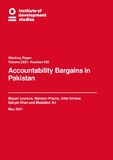Accountability Bargains in Pakistan
| dc.contributor.author | Loureiro, Miguel | |
| dc.contributor.author | Pracha, Maheen | |
| dc.contributor.author | Ahmed, Affaf | |
| dc.contributor.author | Khan, Danyal | |
| dc.contributor.author | Ali, Mudabbir | |
| dc.coverage.spatial | Pakistan | en |
| dc.date.accessioned | 2021-05-27T10:32:23Z | |
| dc.date.available | 2021-05-27T10:32:23Z | |
| dc.date.issued | 2021-05-27 | |
| dc.identifier.citation | Loureiro, M.; Pracha, M.; Ahmed, A.; Khan, D. and Ali, M. (2021) Accountability Bargains in Pakistan, IDS Working Paper 550, Brighton: Institute of Development Studies, DOI: 10.19088/IDS.2021.046 | en |
| dc.identifier.isbn | 978-1-78118-805-7 | |
| dc.identifier.issn | 2040-0209 | |
| dc.identifier.uri | https://opendocs.ids.ac.uk/opendocs/handle/20.500.12413/16623 | |
| dc.description.abstract | Poor and marginalised citizens rarely engage directly with the state to solve their governance issues in fragile, conflict and violence-affected settings, as these settings are characterised by the confrontational nature of state–citizen relations. Instead, citizens engage with, and make claims to, intermediaries some of them public authorities in their own right. What are these intermediaries’ roles, and which strategies and practices do they use to broker state–citizen engagement? We argue that in Pakistan intermediaries make themselves essential by: (1) being able to speak the language of public authorities; (2) constantly creating and sustaining networks outside their communities; and (3) building collectivising power by maintaining reciprocity relations with their communities. In doing so, households and intermediaries engage in what we are calling ‘accountability bargains’: strategies and practices intermediaries and poor and marginalised households employ in order to gain a greater degree of security and autonomy within the bounds of class, religious, and ethnic oppression. | en |
| dc.description.sponsorship | Foreign, Commonwealth & Development Office | en |
| dc.language.iso | en | en |
| dc.publisher | Institute of Development Studies | en |
| dc.relation.ispartofseries | IDS Working Paper;550 | |
| dc.rights | This is an Open Access paper distributed under the terms of the Creative Commons Attribution 4.0 International licence (CC BY), which permits unrestricted use, distribution, and reproduction in any medium, provided the original authors and source are credited and any modifications or adaptations are indicated. | en |
| dc.rights.uri | http://creativecommons.org/licenses/by/4.0/ | en |
| dc.subject | Governance | en |
| dc.subject | Politics and Power | en |
| dc.subject | Security and Conflict | en |
| dc.title | Accountability Bargains in Pakistan | en |
| dc.type | IDS Working Paper | en |
| dc.rights.holder | Institute of Development Studies | en |
| dc.identifier.team | Power and Popular Politics | en |
| dc.identifier.doi | 10.19088/IDS.2021.046 | |
| rioxxterms.funder | Default funder | en |
| rioxxterms.identifier.project | Default project | en |
| rioxxterms.version | VoR | en |
| rioxxterms.versionofrecord | 10.19088/IDS.2021.046 | en |
| rioxxterms.funder.project | 9ce4e4dc-26e9-4d78-96e9-15e4dcac0642 | en |
Files in this item
This item appears in the following Collection(s)
Except where otherwise noted, this item's license is described as This is an Open Access paper distributed under the terms of the Creative Commons Attribution 4.0 International licence (CC BY), which permits unrestricted use, distribution, and reproduction in any medium, provided the original authors and source are credited and any modifications or adaptations are indicated.


